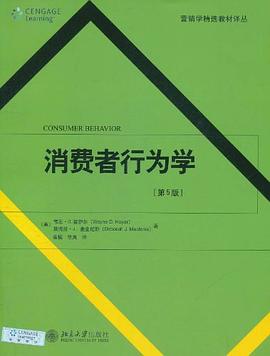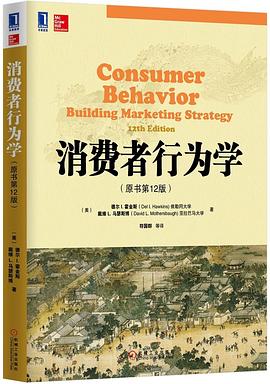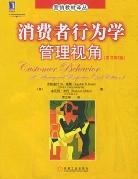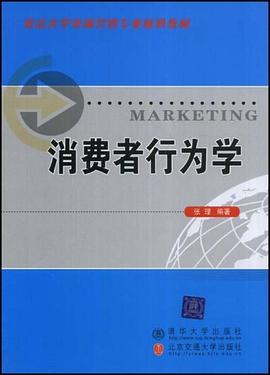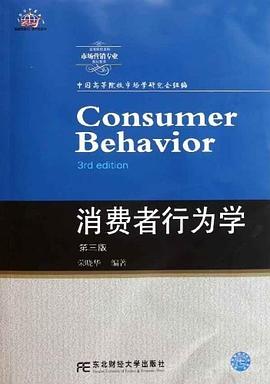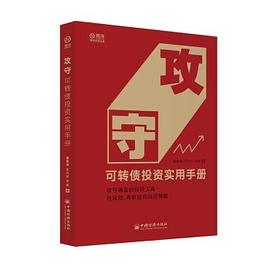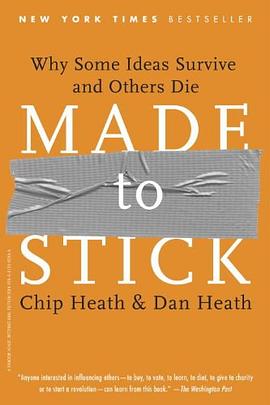

具体描述
What is that makes urban myths so persistent but many everyday truths so eminently forgettable? How do newspapers set about ensuring that their headlines make you want to read on? And why do we remember complicated stories but not complicated facts? In the course of over ten years of study, Chip and Dan Heath have established what it is that determines whether particular ideas or stories stick in our minds or not, and "Made to Stick" is the fascinating outcome of their painstaking research.Packed full of case histories and thought-provoking anecdotes, it shows, among other things, how one Australian scientist convinced the world he'd discovered the cause of stomach ulcers by drinking a glass filled with bacteria, how a gifted sports reporter got people to watch a football match by showing them the outside of the stadium, and how high-concept pitches such as 'Jaws on a spaceship' ("Alien") and 'Die Hard on a bus' ("Speed") convince movie executives to invest vast sums of money in a project on the basis of almost no information. Entertaining and informative by turns, this is a fascinating and multi-faceted account of a key area of human behaviour. At the same time, by showing how we can all use such cleverly devised strategies as the 'Velcro Theory of Memory' and 'curiosity gaps', it offers superbly practical insights, setting out principles we all can adopt to make sure that we get our ideas across effectively.
作者简介
Chip Heath is a Professor of Organizational Behavior in the Graduate School of Business at Stanford University. His research examines why certain ideas - ranging from urban legends to folk medical cures, from Chicken Soup for the Soul stories to business strategy myths - survive and prosper in the social marketplace of ideas. His research has appeared in a variety of academic journals, and popular accounts of his research have appeared in Scientific American, the Financial Times, the Washington Post, BusinessWeek, Psychology Today, and Vanity Fair. He lives in Los Gatos, California. Dan Heath is a consultant at Duke Corporate Education, one of the world's top providers of executive education. Prior to joining Duke, he was a researcher at Harvard Business School, writing 10 cases on entrepreneurship that are used in business school programmes. Heath is also the co-founder of Thinkwell, a publishing company dedicated to creating high-quality, multimedia university textbooks. Dan has an MBA from Harvard Business School. He lives in Raleigh, North Carolina.
目录信息
读后感
创意的6个基本要素:简约(Simple)、意外(Unexperted)、具体(Concrete)、可信(Credible)、情感(Emotional)、故事(Stories) 如果你同时说三件事,就等于什么都没说 一个让你的创意变得更有粘性的好方法: 1)明确你要传达的主要信息——找到核心 ...
评分用户新增难做,维护老用户,增加复购现在显得越来越重要,下面4中策略可以有效提升复购率 ①搭建合理的会员体系:常见的做法如会员等级体系、会员尊享活动、积分换购、会员成长体系等等。 ②商品拥有权和消费权分离:最有效的用户忠诚就是质押,为用户有东西在你手里,又为了避...
评分最近混cpa的小组,经常有人问“怎么报名,什么时候考试,报名费多少”,就会疑惑怎么问这么基础的东西,后来突然想起当时我也百度了好久。这就是“知识的诅咒”——一旦我们知道某样东西,就会很难想象不知道他时是什么样子。所以工程师无法跟顾客沟通;差劲的老师不知道怎么教...
评分让创意更有黏性:创意直抵人心的六条路径 2015-09-19 公共利益科学中心希望向世界分享一些必要信息,于是想出了这种传播理念的方式,试图让人相信并给予关注。最后,这个创意像偷肾故事一样,产生了黏性。 注: 这就是果壳网要/在做的事 2015-09-19 某种程度上,万圣节毒糖果...
评分用户新增难做,维护老用户,增加复购现在显得越来越重要,下面4中策略可以有效提升复购率 ①搭建合理的会员体系:常见的做法如会员等级体系、会员尊享活动、积分换购、会员成长体系等等。 ②商品拥有权和消费权分离:最有效的用户忠诚就是质押,为用户有东西在你手里,又为了避...
用户评价
这是一本让我对“如何让想法传递并产生影响”这件事有了颠覆性认识的书。我一直认为,一个好的想法,只需要足够清晰地表达出来,并且有扎实的证据支持,就能赢得别人的认同。但是,《Made to Stick》这本书,用极其生动和令人信服的案例,向我展示了“粘性”的真正力量。它不是关于复杂的理论,而是关于如何让信息像“粘胶”一样牢牢地附着在人们的脑海中。书中的“简单性”原则,让我意识到,有时候,最核心、最动人的信息,往往是最简洁的。它就像一句口号,虽然只有几个字,却能引发共鸣,驱动行动。这与我过去追求“面面俱到”的表达方式截然不同。我更深刻地体会到,与其试图塞给听众大量的信息,不如找到那个最核心、最能打动人心的“点”,并将其放大。书中的“意外性”原则也给我留下了深刻的印象。在信息爆炸的时代,要想让自己的想法被注意到,就必须学会制造“惊喜”,打破人们的固有认知。这种“意外”可以是一个意想不到的转折,一个非传统的比喻,或者一个挑战人们常识的观点。它能够瞬间抓住听众的注意力,并激发他们进一步了解的兴趣。而“具体性”原则,更是让我看到了将抽象概念转化为生动画面的力量。很多时候,我们过于依赖抽象的陈述,而忽略了为听众构建一个清晰、可感知的心理图像。这本书让我学会了如何用鲜活的例子、生动的场景来传递信息,让听众能够感同身受,从而更容易记住和接受。总而言之,《Made to Stick》不仅仅是一本书,它更像是一个“沟通导师”,它用一种引人入胜的方式,教会我如何让我的想法更有“粘性”,如何让我的声音在嘈杂的世界中脱颖而出,并最终产生持久的影响。
评分读完《Made to Stick》,我感觉自己像是获得了一套关于“思想传播”的秘密武器。这本书的论述方式非常独特,它不回避那些看似“不那么高尚”的传播技巧,而是直面我们如何让信息更具“粘性”,更易于被人们记住、理解和传播。我尤其被书中的“情感”原则所打动。过去,我一直认为,理性是说服他人的基石,但这本书却让我明白,触动人心,唤起情感,才是让信息产生持久影响的关键。无论是为了激发人们的同情心,还是为了唤起他们的希望,情感的注入都能让信息在人们心中留下更深的印记。书中的“故事”原则,更是让我看到了叙事的力量。它不仅仅是简单地陈述事实,而是通过构建一个引人入胜的情节,让人们在故事中体验、感受,并最终接受其中的信息。这就像是将抽象的道理,用一种具象化、生活化的方式呈现出来,让人觉得亲切而易于理解。我发现,很多时候,我们之所以难以让他人信服,正是因为我们的表达方式过于生硬、过于理性,而缺乏与人情感上的连接。这本书提供了许多方法,让我能够将自己的想法,用一种更具人情味、更能触动人心的形式传递出去。它帮助我打破了“理性至上”的思维定式,让我学会了如何巧妙地运用情感和故事,让我的观点更有“粘性”,更易于在人们心中扎根。这对我来说,无疑是一次思维上的重大突破,也让我对未来的沟通充满了信心。
评分这本书给我带来的最大惊喜,在于它将“简单”、“意外”、“具体”、“可信”、“情感”、“故事”这些看似零散的元素,巧妙地编织成了一个完整的“粘性”框架。我之前一直觉得,要想让别人记住我的想法,就必须把信息说得越详细越好,包含越多的细节越能证明我的专业性。但这本书完全颠覆了我的这个观念。它强调的“简单性”并不是信息的单薄,而是要提炼出最核心、最能打动人心的那一点。就像一句广告语,虽然只有几个字,却能让人过目不忘。书中的“意外性”原则也让我印象深刻,它提醒我们,在信息爆炸的时代,要想脱颖而出,就必须制造惊喜,打破人们的预期。这让我开始思考,如何在自己的表达中加入一些出人意料的转折,或者使用一些不落俗套的比喻,来吸引听众的注意力。而“具体性”的重要性更是贯穿全书,它让我明白了,抽象的概念很难被理解和记住,只有将其转化为生动的画面和鲜活的例子,才能真正深入人心。我曾经在尝试向团队解释一个复杂的项目时,遇到了很大的困难,大家似乎都无法抓住重点。读完这本书后,我尝试用更具象的比喻和场景来描述,结果效果截然不同。大家很快就理解了项目的核心目标,并且能够更积极地参与讨论。这本书还深入探讨了“可信性”的来源,它不仅仅是依赖权威数据,更是通过一些巧妙的叙事方式,让信息本身变得可信。例如,书中提到的“信任的标记”,让我学会了如何让自己的观点更具说服力。它不是一本让你学会如何“演戏”的书,而是一本让你学会如何“真诚地”触动人心的书。我将这本书的原则运用到我的日常工作中,发现自己与他人的沟通效率和质量都有了显著的提升,这让我感到非常欣慰。
评分《Made to Stick》这本书,就像一位技艺精湛的匠人,将那些能够让思想“粘”在人们脑海中的核心要素,细致地打磨并呈现出来。它所阐述的六个原则——简单、意外、具体、可信、情感、故事——层层递进,相互支撑,构成了一个完整的“粘性”理论体系。我尤其对“意外性”的探讨印象深刻。在当今信息洪流中,能够吸引和维持人们的注意力,本身就是一项巨大的挑战。这本书教会了我,如何通过制造“惊喜”,打破听众的惯性思维,让他们在惊愕之余,产生探索的欲望。这并非是故弄玄虚,而是用一种更具吸引力的方式,让信息的传递更加高效。同样,书中的“可信性”原则也让我受益匪浅。它不再仅仅强调权威的数据和专家论证,而是深入挖掘了那些能够建立信任的“微观”要素。比如,通过“信任标记”来增强信息的说服力,或者利用“小人物”的真实经历来证明一个宏大的观点。这些方法,虽然看似细微,却能有效地在听众心中建立起深刻的信任感。我发现,将这些原则运用到我的日常工作中,无论是项目演示、团队沟通,还是对外宣讲,都带来了显著的改善。它帮助我更加清晰地梳理我的想法,并以一种更具吸引力、更易于传播的方式呈现出来。这本书,就像一个“思想的催化剂”,让我能够更好地将我的想法转化为能够触动人心、激发行动的“粘性”信息。
评分这本书最让我着迷的地方,在于它将那些看似“天生就能言善辩”的人所拥有的特质,拆解成了一套可以学习和掌握的技能。在我过去的认知里,有些人天生就有一种“光环”,无论说什么,都能轻易地吸引别人的注意,让大家信服。而《Made to Stick》这本书,则揭示了这背后隐藏的“粘性”密码。它不仅仅是关于如何“说”,更是关于如何“让别人记住并传播”。书中的“可信性”原则,尤其令我印象深刻。它并非仅仅强调权威数据或专家背书,而是通过一些更微妙、更具人情味的方式来建立信任。比如,利用“小人物”的真实经历,或者创造一些令人印象深刻的“信任标记”,都能有效地增强信息的说服力。这让我明白,有时候,一个真实的小故事,比一堆冰冷的数据更能打动人心。同时,书中的“简单性”原则也让我意识到,信息过载是现代社会沟通的最大敌人。要想让自己的想法被记住,就必须将其提炼到最核心、最简洁、最容易理解的程度。这并不是牺牲信息的深度,而是找到那个最能引起共鸣的“点”,并将其放大。我过去常常犯的错误是,试图将所有的信息都塞给听众,结果反而让他们感到不堪重负,无法抓住重点。这本书让我学会了如何“做减法”,如何让信息变得更“瘦身”,更有力量。它为我提供了一个清晰的框架,帮助我识别并运用那些能够让信息“粘性”十足的元素,从而在沟通中取得更好的效果。
评分这本书简直就像一股清流,彻底颠覆了我对“有说服力”这件事的固有认知。过去,我一直以为,只要观点够扎实,论据够充分,就能让别人心悦诚服。但《Made to Stick》这本书让我意识到,事实远比我设想的要复杂得多。它不仅仅是关于“说什么”,更关键的是“怎么说”。书中的许多案例都让我拍案叫绝,原来那些看似普通却异常成功的想法,背后竟然隐藏着如此精妙的传播技巧。我特别喜欢它提到的“简单性”原则,强调要将核心信息提炼到极致,就像一句朗朗上口的口号,直击人心。这种直观而强大的影响力,是我之前从未深入思考过的。这本书的语言风格非常吸引人,读起来一点也不枯燥,反而充满了启发性和趣味性。它不是那种让你死记硬背理论的书,而是通过生动的故事和深入浅出的讲解,让你在不知不觉中掌握了沟通的艺术。我常常在阅读时,脑海中会浮现出自己平时遇到的各种沟通场景,然后对照书中的原理,去分析为什么有些沟通会失败,而有些则能产生巨大的共鸣。这种反思的过程,让我受益匪浅。我还会时不时地翻阅其中的某些章节,因为我发现,每一次阅读都能有新的体会和感悟。它就像一本字典,每次查阅都能找到新的词汇来描述我内心的想法,或者帮助我更清晰地表达自己的观点。这本书的影响力已经渗透到了我生活的方方面面,从工作中的项目汇报,到与家人朋友的日常交流,我都能感受到它带来的积极变化。我越来越相信,好的想法,如果不能有效地传播出去,那它就只是一闪而过的灵感,无法真正改变世界。而《Made to Stick》恰恰给了我实现这一目标的钥匙。
评分《Made to Stick》这本书,就像一把精密的尺子,让我得以衡量和提升我与他人沟通时的“粘性”。它所揭示的六个原则,——简单、意外、具体、可信、情感、故事,——并非是孤立的概念,而是相互关联、相辅相成的。我最先被吸引的是“具体性”的讨论。我过去常常犯的错误是,在描述一个概念时,过于抽象,以至于听众难以理解其精髓。这本书让我意识到,将抽象的概念转化为生动的画面,或者用一个可感知的例子来解释,能够极大地增强信息的传播效果。比如,在描述一个新产品的优势时,与其泛泛而谈其“创新性”,不如直接展示一个用户通过这个产品解决了什么具体问题的场景。这种“画面感”的构建,是让信息“粘性”十足的关键。同时,书中的“意外性”原则也让我跃跃欲试。在信息爆炸的时代,人们的注意力是极其稀缺的。要想抓住听众的眼球,就必须学会制造“惊喜”,打破他们的预期。这种“意外”可以是一个出乎意料的结论,一个非传统的比喻,或者一个反转的故事。它能够瞬间抓住听众的注意力,并激发他们进一步探索的欲望。我发现,将这些原则灵活运用到我的日常工作中,能够显著提升我与团队成员、客户以及合作伙伴的沟通效果。它不仅仅是教你如何“说”,更是教你如何“让别人愿意听,并记住你所说的”。这本书的价值,远超于一本普通的沟通技巧指南,它为我提供了一种全新的思考方式,让我能够更深刻地理解“思想的传播”这一复杂而又迷人的过程。
评分这本书给我带来的最深刻的改变,在于它让我从一个“信息输出者”转变为一个“影响力创造者”。在阅读《Made to Stick》之前,我总认为,只要我的想法足够好,逻辑足够严谨,总有一天会被大家所理解和接受。然而,这本书却告诉我,仅仅“好”是不够的,更重要的是要让它“粘得住”。书中的“情感”原则,让我意识到,人类的决策很大程度上是受情感驱动的,而不仅仅是理性分析。当我尝试在我的工作中,用更具情感色彩的语言去描述项目的意义和价值时,我发现团队成员的参与度和积极性都有了显著的提升。他们不再仅仅是将工作视为一项任务,而是开始体会到其中的价值和意义。同时,书中的“故事”原则,更是让我看到了叙事的力量。一个好的故事,能够将抽象的道理具象化,让听众在故事中体验、感受,并最终内化其中的信息。我开始有意识地在我的演示和沟通中,融入更多的个人经历和生动的故事,结果发现,信息传递的效果比以往任何时候都要好。它让我明白,人们更容易被那些能够触动他们内心深处的故事所吸引,而不仅仅是那些冰冷的数据和论据。这本书不仅仅是关于如何让信息更容易被记住,更重要的是,它教会了我如何让信息产生持久的影响力,如何在人们心中播下思想的种子,并看着它们生根发芽。
评分读完这本书,我感觉自己像是获得了一份全新的“沟通宝典”。它所揭示的“粘性”概念,不仅仅是让信息容易被记住,更是让它能够深入人心,甚至引发行动。我最深刻的体会是关于“具体性”的力量。很多时候,我们认为抽象的道理很难打动人,但这本书通过大量生动的例子,说明了如何将抽象的概念转化为具象的画面,让听众能够感同身受。比如,书中提到的“芝麻街”就是一个很好的例子,它用形象化的方式将教育理念融入到孩子们喜爱的节目中,从而取得了巨大的成功。这让我反思,在自己的工作和生活中,是不是因为过于依赖抽象的陈述,而错失了许多与人建立连接的机会?书中的“情感”原则也给我留下了深刻的印象。我们常常低估了情感在说服过程中的作用,但事实证明,能够触动人心的信息,往往比单纯的逻辑陈述更能引起共鸣,并最终促成改变。我尝试将书中提到的方法运用到我的PPT演示中,结果发现,听众的参与度和反馈都有了显著的提升。他们不再是被动地接收信息,而是开始主动思考,甚至提出自己的见解。这种互动性的增强,让我看到了“粘性”的真正威力。这本书的结构也非常清晰,每个原则都配有详实的案例分析,让你能够理解理论的来源,并学会如何灵活运用。我特别欣赏它没有给人一种“这是唯一的正确方法”的感觉,而是提供了一套框架,鼓励读者根据自己的情况进行调整和创新。它就像一个“万能公式”,你可以根据具体的问题,从中提取最适合的元素,组合出最佳的解决方案。总而言之,《Made to Stick》是一本让我受益匪浅的书,它不仅提升了我的沟通技巧,更重要的是,它让我重新认识了“影响”的本质。
评分《Made to Stick》这本书给我带来的启发,就像是打开了一扇通往全新沟通世界的大门。在阅读之前,我总觉得那些能够让众人信服、甚至产生巨大影响的思想,是少数天才的专属技能,而我这样的普通人,似乎难以企及。然而,这本书却用一种非常务实和易于理解的方式,向我展示了“粘性”思维的奥秘。它不再是那些晦涩难懂的学术理论,而是通过大量生动鲜活的案例,将那些隐藏在成功故事背后的驱动力一一揭示。我尤其对书中“意外性”的章节印象深刻,它让我明白,要想让信息在嘈杂的世界中被听到,就必须学会制造“惊喜”,打破人们的固有认知。这种“意外”不仅仅是内容的突兀,更是一种思维方式上的颠覆,让人在惊叹之余,能够立刻产生探索的欲望。同时,书中的“具体性”原则也让我受益匪浅。我过去常常犯的一个错误就是,总以为说得越“大道理”,越能体现思想的深度,但事实证明,那些能够唤起听众脑海中具体画面的信息,才更容易被理解和记住。这本书让我学会了如何将抽象的概念转化为可感知的元素,就像在听众脑海中绘制一幅生动的图画。此外,书中对“可信性”的探讨也让我耳目一新。它不再仅仅强调数据的堆砌,而是挖掘出更多人性化的、能够建立信任的渠道,比如利用“小人物”的故事来证明一个宏大的观点。我发现,这本书的每一个原则都像是一把钥匙,能够解锁我在沟通中遇到的种种困境。它不是那种读完就束之高阁的书,而是能够引导我不断反思和实践的“生活指南”。我常常在工作汇报、团队会议,甚至日常交流中,自觉不自觉地运用书中的方法,并且惊喜地发现,沟通的效果确实不一样了。
评分leadership课必读书。。。。。不过还蛮不错得
评分leadership课必读书。。。。。不过还蛮不错得
评分leadership课必读书。。。。。不过还蛮不错得
评分leadership课必读书。。。。。不过还蛮不错得
评分leadership课必读书。。。。。不过还蛮不错得
相关图书
本站所有内容均为互联网搜索引擎提供的公开搜索信息,本站不存储任何数据与内容,任何内容与数据均与本站无关,如有需要请联系相关搜索引擎包括但不限于百度,google,bing,sogou 等
© 2026 book.wenda123.org All Rights Reserved. 图书目录大全 版权所有


